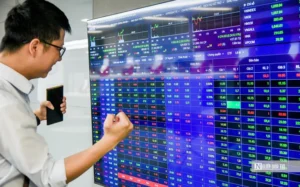Global green policies have had, are having, and will have a strong impact on Vietnam’s trade flows and investment attraction trends.
The 2024 International Economic Cooperation and Integration (CIECI 2024) Conference Series
was held at the University of Economics, Vietnam National University, Hanoi for 2 days (November 22-23). Sharing at the event, economic experts said that the policy of greening the economy is taking place globally, which has, is and will strongly affect the flow of trade and investment in the world, including Vietnam.
According to information from the workshop, the globalization process has been extensive with countries actively removing trade barriers, promoting trade and investment facilitation, causing international trade and international investment flows to increase strongly in recent decades. Trade and investment growth has become the driving force for economic growth, but it is also the cause of environmental degradation, air, land and water pollution, and loss of biodiversity.
Speaking at the workshop, Associate Professor, Dr. Le Trung Thanh – Principal of the University of Economics – Vietnam National University, Hanoi – said: According to information from the World Trade Organization (WTO), production and transportation of import and export goods emit about 20% – 30% of global carbon emissions, leading to climate change.
Faced with these issues, many countries around the world have recognized the need to enact green policies and integrate environmental goals into economic policymaking. In particular, countries in the European Union (EU) are working to align their trade policies with their environmental ambitions. The US administration has committed to rejoining the WTO and reestablishing its role in multilateral environmental diplomacy. In addition to the advantages of reducing labor and production costs brought by globalization, some developed countries have actively shifted their supply chains abroad to reduce carbon emissions. Meanwhile, developing countries are passive in green policies because they are familiar with looser environmental regulations and do not have enough resources to go green.
Meanwhile, Professor Anuj Kumar – Head of Research, Rushford Business School (Switzerland) – said: India is attracting FDI flows into the solar, wind and green hydrogen sectors. This increasing focus on sustainability not only supports India’s energy security but is also in line with global climate goals, bringing long-term economic benefits.

Global trade, investment affected by green policies
At the workshop, the presentations of economic experts also affirmed that the green policies of countries will impact global trade and investment activities, including Vietnam. Specifically, Associate Professor, Dr. Vu Thanh Huong – Deputy Head of the Faculty of Economics and International Business, University of Economics, Vietnam National University, Hanoi – affirmed: The EU’s introduction of the Carbon Border Adjustment Mechanism (CBAM) can significantly impact Vietnam’s exports, especially in carbon-intensive industries such as textiles, footwear and steel. This new trade barrier can encourage Vietnam’s industries to invest in sustainable activities, but it can also challenge competitiveness, especially for small and medium-sized enterprises that lack resources for the green transition .
According to Professor Yovogan Marcellin – Sofia University (Bulgaria): Implementing green finance and ESG requirements can improve the financial performance of fintech companies by attracting socially conscious investors and expanding access to green funding opportunities. He also noted that the associated compliance costs and the need to integrate sustainable practices into initial operations can affect profitability, especially for small fintech companies.
Economists also say that as climate change and environmental sustainability become central to both public and private agendas, countries and companies are increasingly adopting green policies aimed at reducing carbon emissions, promoting renewable energy and fostering a circular economy.
International agreements and greening regulations in free trade agreements (FTAs) are playing a role in shaping countries’ green policies. Moving towards green trade and investment , countries will expand international trade opportunities, and FDI flows will focus more on developing sustainable industries. However, countries will face many barriers, especially in terms of costs and high levels of risk. Therefore, the authors will provide policy implications to help governments and businesses overcome the challenges arising in the process of moving towards greening trade and investment activities.
















